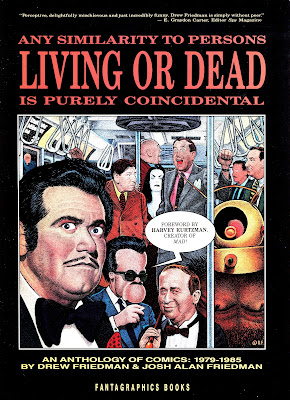Any Similarity to Persons Living or Dead is Purely Coincidental
by Drew Friedman and Josh Alan Friedman
Fantagraphics Books, 1985
Drew Friedman (b. 1958) and his older brother Josh Alan Friedman (b. 1956) are the sons of Bruce Jay Friedman (1930 - 2020), who during the 1950s was a prominent house writer for Martin Goodman's Magazine Management publishing company, before embarking on a successful career as a novelist and playwright.
The Friedman boys grew up submerged in the sensibility of the darker side of urban, New York City, Jewish humor. Drew Friedman attended New York's School of Visual Arts from 1978 to 1981, where Harvey Kurtzman was one of his instructors. Kurtzman provides a brief Forward to 'Any Similarity':
Drew Friedman was one of my more memorable students. It was like if Hitler was one of my more memorable students. You get the idea.
In 1978 the brothers began publishing cartoons and illustrations, some of these in Screw magazine. These cartoons were written by Josh Alan Friedman and featured the meticulous stippling of Drew Friedman. The brother focused their attention on the imagined antics of a generation of prewar and postwar actors and showbiz personalities who, as of the 1970s, either were dead, or elderly, and slipping from the public consciousness.
After starting with Screw, during the early 1980s the Friedmans moved into supplying work for mainstream magazines like Heavy Metal (which is where I first became aware of their stuff) and High Times, eventually branching into Raw and the National Lampoon, among other venues. 'Any Similarity to Persons' (84 pp.) collects black and white and graytone pieces from the Friedman brothers over the interval from 1978 to 1985. It's a large, 9 x 12" trade paperback that displays the artwork to good effect.
In interviews, Drew Friedman indicates that he was trying to reproduce the look of black-and-white photographs with his artwork and this is what makes his imagery so distinctive. He and Josh Alan Friedman depict the characters rendered in these comics with a mixture of affection, pathos, cruelty, and sardonic humor.
The last page of 'Any Similarity to Persons' provides a Glossary of some of the people and caricatures presented in the pages of the book; this helps give context to personalities that were obscure even at the time the Friedmans included them in their cartoons.
I did find myself Googling more than a few of the featured subjects. For example, I had no idea that comedian Lou Costello's year-old son, Lou Costello, Jr., had drowned in the family pool in November, 1943, after slipping out from the bars of his playpen.
An argument could be made that if 'Any Similarity to Persons' is to retain any resonance among modern-day readers, a reprint will have feature annotations of a more comprehensive nature. This is because the personalities satirized in its pages have slipped so far into obscurity that readers under the age of 60 likely will find much of the book's content inscrutable.
Those with the memories and a fondness for the pop culture icons of the era depicted in 'Any Similarity to Persons' will find the book engrossing. Even those lacking in familiarity with the era still may enjoy the book for its meticulous artwork and potent atmosphere of mordant comedy.
I would be remiss if not pointing out that Drew Friedman has released other collections of his artwork, and his 2007 trade paperback, 'The Fun Never Stops', which focuses on pop culture of the 80s and 90s, likely will find greater rapport with with a younger generation of readers.

































